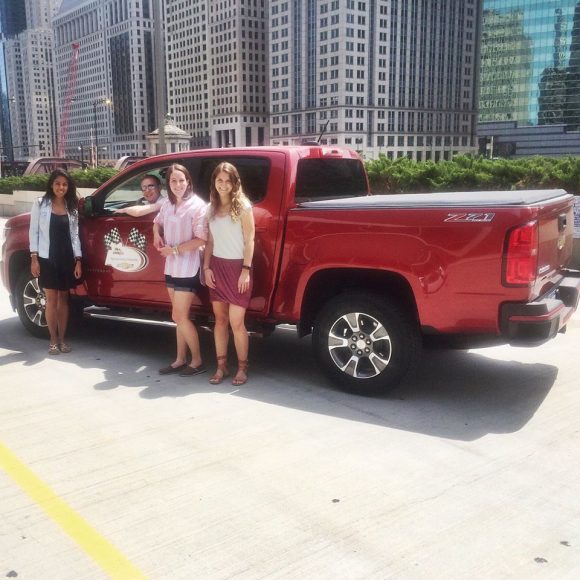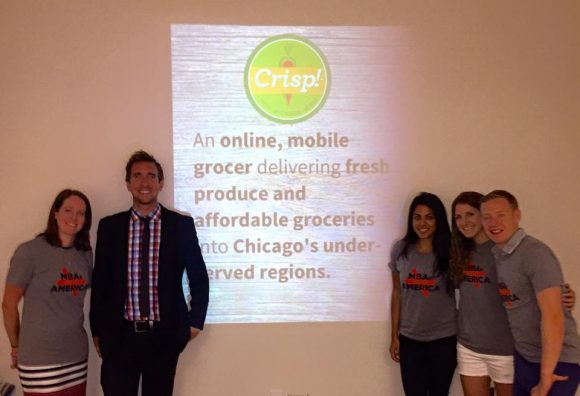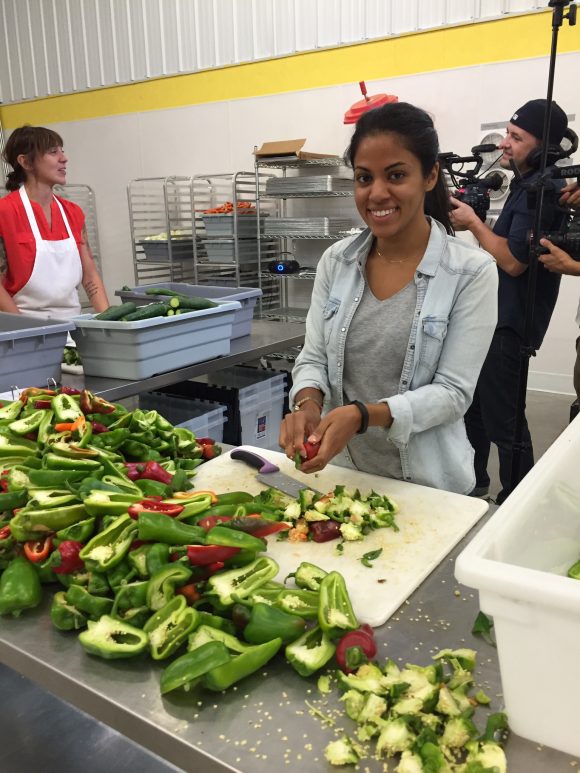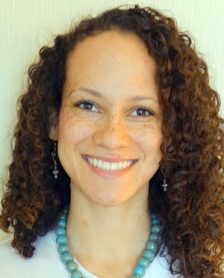
A Summer Cross-Country Consulting Spree
This past summer, a group of intrepid Yale SOM students set off on cross-country consulting journeys designed to give small entrepreneurs a leg up. Some students joined teams sponsored by MBAx America (MBAs Across America), a nonprofit which every year sends teams of MBAs out to work with visionary entrepreneurs—and some students undertook a similar voyage on their own.
 Nilofer Ahmed ’16
Nilofer Ahmed ’16
AOL.com videotaped portions of this trip as part of an original series exploring the challenges and opportunities of small business in revitalizing communities. Nilofer shares some of the lessons she learned during her journeys.
One of my favorite things about SOM is the sheer diversity of the student body, from backgrounds and aspirations to demographics and personality types. I wanted my summer experience to mirror that same diversity, which resulted in a more traditional consulting internship at The Boston Consulting Group followed by MBAs Across America, a program where teams of MBA students drive across the country working with entrepreneurs who are doing great things in their communities.
Affectionately known as the “mutt” of the program, my team represented 3 business schools—SOM, Harvard Business School, and the Fisher College of Business (#TeamFishardale). Looking back on it now, it’s clear that coming from these varied schools of thought really had a positive impact on our experience and the quality of deliverables we were able to bring to the table for our entrepreneurs.

“Big Red,” racing flag decals and all!
Our first stop was the Detroit Food Academy, an organization empowering high school students to create their own triple-bottom line food business, creating the next generation of entrepreneurs tackling problems within the food system. Here, we learned the power of perception in a vibrant city that is now very different from the image of it consistently portrayed in the media.
In Chicago, we worked with Mike Hyzy of Crisp! Mobile Grocery, a passionate entrepreneur working to improve access to affordable, healthy groceries in Chicago’s food deserts. Crisp! is the only online grocery service that accepts SNAP/EBT benefits, and Mike’s dream is to turn it into a self-sustainable social enterprise. As we built pitch decks and sought out investment opportunities, we discovered the value of finding the crux of your business and focusing on what you’re best at.

Next, we made our way to Fargo, South Dakota, to work with the Fargo Brewing Company as they considered a potential expansion into the Canadian market up north. The team, with backgrounds ranging from brewing to marketing and sales, welcomed us into their community (and their local newspaper!), and we quickly fell in love with Fargo. Here, we focused on the importance of telling your story—as a local brewery that makes great beer, the Fargo Brewing Company is a huge presence within their community and sharing that story gives them a personality they can convey in new markets.

(he didn’t let us forget our less-than-stellar average team height!)
After a quick pitstop at Mount Rushmore, we made it to our final destination, Root Cellar Foods in Belgrade, Montana. Christina Angell is a master of all trades, juggling numerous hats at her business, from business development and marketing straight through to food processing in the factory. Working in her factory and visiting the local growers in the area, we honed in on small optimizations that could give her back the time she needs to focus on growing her business. By the end of the week, we had created ways to automate her ordering system, designed training programs for her factory floor, and investigated new markets she could explore going forward. We even made it onto the local news at 7!

and the AOL film crew in the background
Going into the experience, it was hard to predict what our month on the road would look like. Reflecting on it now, it was a real adventure that completely changed the way I think about the importance of entrepreneurship in revitalizing communities as well as our own ability to make an impact in a finite amount of time. In particular, my team’s focus on food access and food inequity (with a brewery thrown in for good measure!) has really shaped the way I think about the “farm-to-table” movement and the importance of local produce in our communities.
Please feel free to reach out if you’d like to talk more about the MBAs Across America movement—I’m happy to chat more about my experience this summer!
 Brittan Berry ’16
Brittan Berry ’16
A local news station in New Orleans aired a story featuring some of the work undertaken by Brittan Berry’ 16, Sarah Lockridge-Steckel ’16, JP Julien ’16, SPH ’16, and Kevin Elliott ’16 on their trip. Brittan shares some thoughts on the trip:
It was a humbling, inspiring, exhausting, and crazy experience on the road for a month. We worked with the Lower 9th Ward Market in New Orleans—10 years after Hurricane Katrina and this area of New Orleans still doesn’t have a grocery store (USDA classifies it as a food desert). We worked with an amazing man with a big heart for his community to fix that. We equipped him with a better way to track inventory and expenses, a fundraising platform to raise working capital, marketing materials, and partnerships in the city to keep the store growing.
 We then went to Atlanta, where we worked with two women entrepreneurs who aimed to use science and technology to better help black women find the best products and styles for their hair with their company, Myavana. By the end of the week, we had completely changed their business model and redesigned their marketing, with their website and their new launch plan being executed as we speak.
We then went to Atlanta, where we worked with two women entrepreneurs who aimed to use science and technology to better help black women find the best products and styles for their hair with their company, Myavana. By the end of the week, we had completely changed their business model and redesigned their marketing, with their website and their new launch plan being executed as we speak.
While Nashville is known as the Music City, North Nashville sings a different tune. We worked with a skateboard company that was opening up their shop in an area that had been abandoned by businesses (but they are building it back up!), Salemtown Board Company, to fight poverty, bring about economic development, and give tutoring and learning opportunities to local teens (whom they employ). We worked on strategy for both launching a new retail space and a presence on e-commerce.
By the end of the week, we had completely changed their business model and redesigned their marketing, with their website and their new launch plan being executed as we speak.
Lastly, we went to Detroit and worked with Ellis Island Tea, where we analyzed her business’ current financial state, refocused her value proposition, made a plan for expansion, and developed resources to be used in investment pitches.

And sometimes our work involved things you don’t learn in business school; we often found ourselves doing everything from restocking shelves, serving snowcones (or “snowballs” as they call them in New Orleans), and making skateboards to entertaining little kids, etc. We weren’t there just to give them fancy PowerPoints, spreadsheets, and some big ideas; we were there to be a family, a group they knew they could trust and a group that wanted them to succeed. And so no task was too small, because this is what a family does.

Molly Zeff ’16
Molly Zeff ’16 was part of a student team that undertook a cross-country consulting spree—not under the auspices of MBAx America, but on its own—planning all the logistics and lining up projects. Molly shares a little bit of the execution by the numbers:
- 3 Number of students who joined in person or remotely for small parts of the trip
- 7 Number of Car companies I reached out to for a car (5 St. Louis dealerships, Enterprise, and Tesla)
- 0 Number of car companies that funded me before I realized I need to get my car from Colorado to Connecticut anyway...
- 4 Number of cities I worked in
- 4 Number of social enterprises for which I worked on projects
- 5 Number of days allocated to complete a project
- 21 Number of interviews scheduled and conducted over 4 weeks to learn from former colleagues, leaders (in the fields represented by our projects), classmates, and friends
- 2,190.7 miles driven from Denver, Colorado → Kansas City, Missouri → St. Louis, Missouri → Elgin, Illinois → Chicago, Illinois → Detroit, Michigan → New Haven, Connecticut
- 13 Number of places I slept during 4 weeks
- 7 Number of hosts I’d never met before lining up the opportunity to sleep on their floor/futon/air mattress/extra bed
- 1 Number of communes we slept in without electricity and running water...or an indoor bathroom
- $0 Amount we paid for all 13 places
Of course, the numbers only tell a small part of the roller coaster ride of a story documenting those four incredible weeks, given that the point of all these amusing logistics was to work for entrepreneurs on a single project each week and leave them with a plan they could use to grow and improve their social business. When I wasn’t figuring out where to sleep that night or the next, here’s where I was spending amazing full days engaging in some of the most exciting and fun work I’ve ever done:
- MADI Apparel (Make a Difference Intimate Apparel): a one-for-one women’s bamboo underwear company headquartered in Kansas City that donates a pair to victims of domestic violence for every pair it sells; founded because underwear is the number-one most under-donated item in the U.S. The project: design a social media brand-building strategy and come up with a video concept to pitch the brand’s message in a video that will launch this October in time for Domestic Violence Awareness Month.
- Make Space: St. Louis’ first combined artists’ incubator + makerspace (think co-working space for artists, designers, and food entrepreneurs). The project: build a financial sustainability plan for year 1, 5, and 10 to help phase out grants.
- Earth Heart: offers natural sprays that soothe anxiety in dogs and people. The project: design a marketing plan to reach three new target markets and grow sales to current primary market.
- Merit Goodness: a fashion-based clothing brand that offers casual street wear to millennials and Gen. Xers, donates 20% of profits to fund college scholarships for low-income teenagers, and offers these same teenagers four years of free college prep and career prep through its non-profit arm. The project: create a plan to turn the new combined store and workshop space into an in-person and online marketing opportunity to increase traffic to the web store as well as revenue.
All of these projects, the thrill of working with people who in some cases were working two or three jobs to pay rent while they build their dream vision—not to enrich themselves but to serve a population less fortunate—led to a lifetime of invaluable lessons in those few weeks.
I also was delighted (and surprised…) to learn that I was able to use a skill from one of the most challenging first-year classes, Spreadsheet Modeling.
Perhaps the most important “lesson” was that I loved this kind of work. It was fun, it was exciting, I could make a substantial usable deliverable in one week, I was learning cause-based marketing (which I have a passion for), and I was tapping into my greatest strengths: 1) creative, long-term strategic planning, 2) quickly building relationships with strangers (the entrepreneurs and their staffs), and 3) networking with many people from my SOM and working life, which was absolutely necessary to quickly learn how to plan all of the important pieces of each puzzle of a project.
Another fun lesson had to do with ensuring that projects we planned were actually going to be executed, since a disappointingly high percentage of consultants’ work is never carried out. I made sure that every project included a discussion with the entrepreneur about which staff person, intern, or part-time consultant would be in charge of carrying out our recommendations so that the work wouldn’t just sit unused on Google Drive forever.
More specifically, I also was delighted (and surprised…) to learn that I was able to use a skill from one of the most challenging first year classes, Spreadsheet Modeling. I had never built a model before SOM, but during my week at Make Space in St. Louis, I found myself able to easily build a 1-, 5-, and 10-year financial sustainability plan for a new artists’ co-working space. Sure, this was partly because I had worked in two co-working spaces during my internships in Colorado earlier this summer and studied them for my Outreach Nonprofit Consulting Club gig last year...but I only had the tools to understand what it meant to build a model because of Spreadsheet Modeling. And despite the fact that during the class itself, I was hopeless without TA help on every problem set, I was able to build a model on my own when I reached Make Space.
